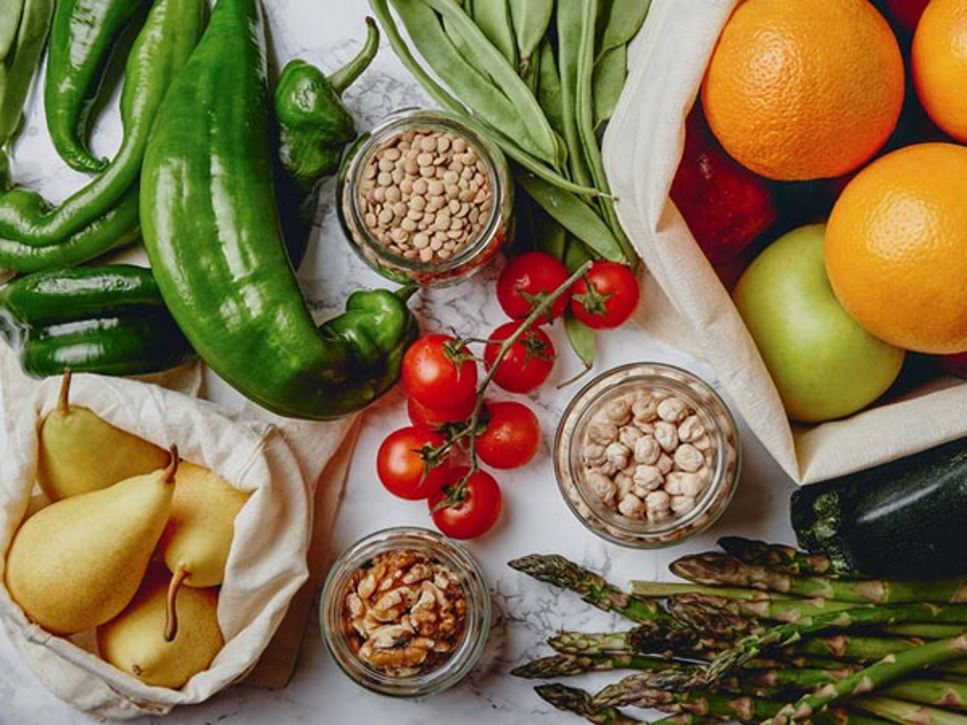The environmental impact of the foods we eat has been getting more attention in recent years. Luckily, there are plenty of easy food-related actions to lighten your carbon footprint while making healthful food choices.
Buy Locally and In Season
Eating locally grown fruits and vegetables helps cut back on fossil fuels used for long-distance transport. Plus, locally produced food is likely fresher and may taste better, cost less and retain more nutrients than foods that have been shipped from far away. Another advantage is that it supports local farmers and keeps dollars in the community. Look for options at the grocery store from local farms. When possible, check out local farmers markets, as well as community-supported agriculture programs, with the USDA's Local Food Directories.
Eat More Plant-based Foods
Choosing more plant-based protein foods such as beans and lentils in place of animal-based protein foods is one way to reduce your carbon footprint. Plant-based eating styles use fewer natural resources and have been associated with less damage to the environment.
Reduce Packaging
Buying in bulk reduces the amount of plastic, paper, metal and energy that goes into manufacturing the packaging. If bulk isn't available, buy in larger packages such as "family sizes" rather than individual sizes. If you can, choose reusable containers and recycle materials like glass, metal, paper and plastic, if these items can be recycled in your area.
BYOB to Get Grocery
Bring your own bags. Even reusing paper or plastic supermarket bags from previous visits can lessen the impact of the petroleum-based plastic bags used each year in the U.S., which often end up as litter, in the landfill and as a pollutant of our fresh waters and oceans.
Conserve Energy in the Kitchen
Purchase energy-efficient appliances when possible. Other energy-saving tips include:
- Think about what you need before you open the refrigerator or freezer to limit how long the doors stay open.
- Cover the pot to heat food more quickly or use a pressure cooker.
- During summer months, run the hood fan to keep gas and heat out of your kitchen so you require less air conditioning to cool the house.
- Cook larger quantities and freeze in single meal portion sizes, which not only saves energy, but gets you almost instant home-cooked meals on other days.
Save Water
It is predicted that water, not fuel, will be our scarcest commodity in the not-too-distant future. So, don't let the sink faucet run.
- Soak dishes in a sink of hot, soapy water to loosen food, wash and rinse all at once.
- If you use a dishwasher, don't bother rinsing the dishes (just scrape them) and run the dishwasher when it is full.
- Repair leaks and drips.
- Install aerators in faucets to make less water more efficient.
- Don't use running water to defrost frozen food; plan ahead and thaw it in advance in the refrigerator.
Bonus Tip: Decrease Garbage
In addition to reducing the packaging you bring home, try composting some of your food waste. Rather than filling the trash can with fruit and vegetable scraps — save them to nourish your garden. Use any container by the sink and haul it outside when it's full. Some municipalities offer free or reduced-price composting bins or bins can be purchased at local garden shops.
Use ceramic dishes and reusable silverware and cups. Avoid using disposable products. If you must use disposables, choose ones that are accepted as part of your neighborhood’s recycling program or can be composted.
Information provided by Hunger and Environmental Nutrition, a dietetic practice group of the Academy of Nutrition and Dietetics.
References
Find a Nutrition Expert
Looking for credible nutrition information and recommendations? The Academy of Nutrition and Dietetics' network of credentialed food and nutrition practitioners are ready to help!

